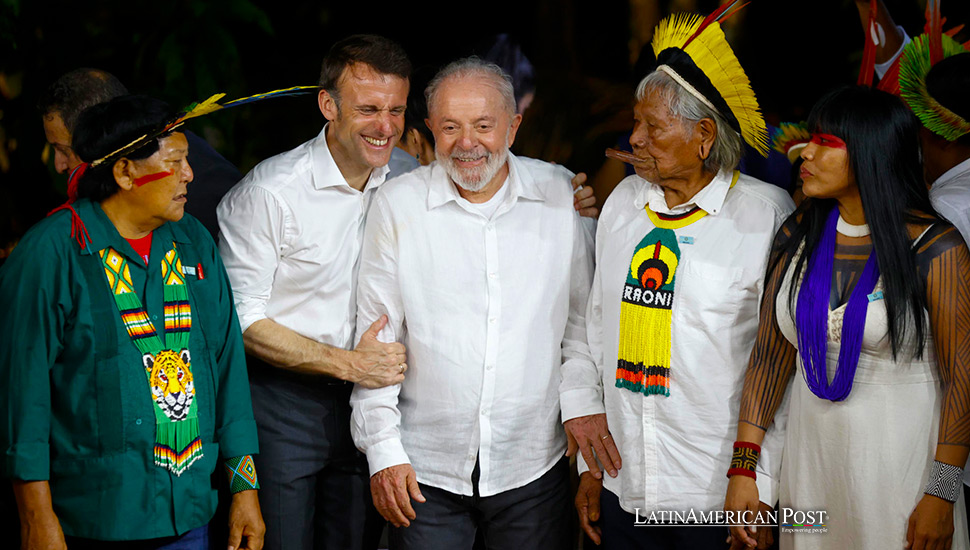Lula Pledges Zero Deforestation in Brazilian Amazon by 2030

Brazilian President Luiz Inácio Lula da Silva commits to eliminating illegal deforestation in the Amazon by 2030, a move that transcends Brazilian borders, signaling a broader Latin American challenge and opportunity in environmental conservation.
Brazil’s Bold Commitment to Halt Deforestation
In a significant declaration reverberating across Latin America, Brazilian President Luiz Inácio Lula da Silva, during a rendezvous with French President Emmanuel Macron, pledged an ambitious goal: to halt illegal deforestation in the Amazon by 2030. This promise, made on the lush, green backdrop of the Amazonian island of Combú, not only underscores Brazil’s autonomous environmental crusade but also casts a spotlight on the collective ecological challenges and responsibilities Latin American nations face.
Lula’s assertion that Brazil’s commitment to zero deforestation is a self-imposed mandate surpasses any previous obligations under international accords like the Paris Agreement. It reflects a broader sentiment prevalent in Latin America: the region’s desire to take control of its environmental destiny, independent of external dictates. This bold initiative by Brazil, home to the most significant portion of the Amazon rainforest, sets a precedent for neighboring countries like Colombia, Peru, and Bolivia, each of which shares a piece of this ecological treasure and faces similar deforestation crises.
The Brazilian president’s strategy hinges on a multifaceted approach, encompassing safeguarding indigenous territories and establishing environmental reserves. Lula’s government has been proactive in demarcating indigenous lands and creating conservation areas, actions that resonate with the broader Latin American struggle to balance economic development with ecological preservation.
Lula’s dialogue with Macron was about environmental policy and a nuanced discourse on the asymmetries between the developed and developing worlds. He pointed out the historical context of European countries having cleared their forests long ago, whereas nations like Brazil are now tasked with preserving what remains of their natural landscapes. This dichotomy highlights the need for developed countries to support conservation efforts in regions like the Amazon, which is critical to global biodiversity and climate stability.
The Amazon as a Global Asset
The Amazon’s significance transcends national boundaries, serving as a vital carbon sink that mitigates climate change. Lula’s call for shared responsibility in preserving this global asset underscores the interconnectedness of environmental challenges. With their rich biodiversity and extensive natural resources, Latin American countries are pivotal to global ecological equilibrium. Lula’s assertion that the Amazon should not become a “sanctuary of humanity” but rather a shared resource for sustainable development and research echoes a common sentiment in the region.
Brazil’s leadership in defining ambitious environmental goals has the potential to inspire neighboring countries to adopt similar conservation initiatives. The Amazonian rainforest, shared among nine nations, requires a collaborative effort to combat deforestation and environmental degradation. Lula’s initiative could thus catalyze a regional conservation strategy, fostering cooperation among Amazonian countries to create a unified front against ecological threats.
The planned COP30 conference in Belém, Brazil, presents an upcoming opportunity for Latin America to showcase its environmental commitments on the world stage. This event will allow global leaders to witness firsthand the challenges and aspirations of the Amazonian region, facilitating a deeper understanding of what is required to protect its unique ecosystems.
A Testament to Latin America’s Environmental Stewardship
The narrative of Brazil and its neighbors in Latin America grappling with environmental conservation is a testament to the region’s evolving relationship with its natural heritage. As countries like Brazil take decisive steps to combat deforestation and protect biodiversity, they set new benchmarks for sustainable development. The commitment to zero deforestation by 2030 reflects an environmental strategy and a broader vision for a sustainable and equitable future in Latin America.
Also read: Brazil’s Coffee Surge: Echoes of Latin America’s Agrarian Shift
Lula’s pledge to eliminate illegal deforestation in the Amazon by 2030 is more than a national commitment; it’s a call to action for Latin America and the world. It signifies a shift towards acknowledging and leveraging the intrinsic value of the Amazon, not only for its ecological benefits but as a cornerstone for regional solidarity and sustainable development. As Latin American countries navigate the complex terrain of economic growth and environmental stewardship, Brazil’s leadership in this domain could catalyze a new era of green diplomacy and ecological responsibility in the region.




